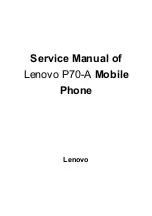
Certification and safety information for the United States and countries using FCC standards
55
Dial sensibly and assess the traffic; if possible, place calls when you are not moving or before pulling into traffic. Try to plan
your calls before you begin your trip. But if you need to dial while driving, follow this simple tip--dial only a few numbers,
check the road and your mirrors, then continue.
Do not engage in stressful or emotional conversations that may be distracting.
Use your wireless phone to call for help. Dial 9-1-1 or other local emergency number in the case of fire, traffic accident, road
hazard or medical emergency.
Use your wireless phone to help others in emergencies. If you see an auto accident, crime in progress or other serious
emergency where lives are in danger, call 9-1-1 or other local emergency number.
Call roadside assistance or a special wireless non-emergency assistance number when necessary. If you see a
broken-down vehicle posing no serious hazard, a broken traffic signal, a minor traffic accident where no one appears injured
or a vehicle you know to be stolen, call roadside assistance or other special non-emergency wireless number.
Summary of Contents for OT8X0 Series
Page 1: ...OT 8x0 Range English...
Page 57: ...57 Declaration of Conformity...
Page 81: ......
Page 82: ......
















































